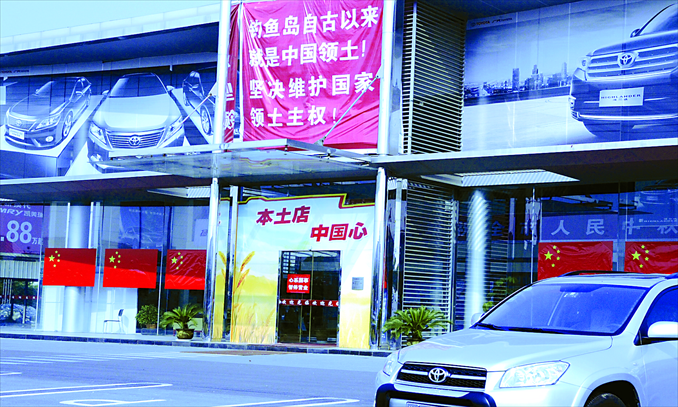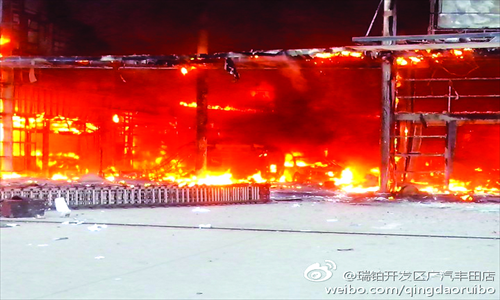When patriotism turns ugly

"It's our fault we bought a Japanese-brand car, and we won't buy any such cars in the future," Li Jianli's wife begged as a group of furious men surrounded their car on September 15.
Turning around, she found her husband had been knocked down, with blood gushing from his head.
The 51-year-old man from Xi'an, Shaanxi Province, is still receiving treatment in a local hospital, with the right side of his body almost paralyzed and language capability severely impaired.
It is unknown to what extent Li will recover from the horrific cranial and brain injuries he suffered when his skull was smashed with a heavy U-shaped bicycle lock.
Large waves of demonstrations were staged across China following Japan's announcement it was to "nationalize" the Diaoyu Islands. Most of them were peaceful, but some turned violent, as protestors showed their resentment toward Japanese products and businesses.
A source close to the Li case told the Global Times that the family is borrowing money from relatives to pay for Li's costly treatment since the medical insurance does not cover his injuries.
"Some local enterprises and warmhearted individuals are also offering a helping hand," said the source.
The anti-Japan protests have seemingly begun to wane, yet most of the innocent victims are having difficulty in claiming compensation from those responsible.
What's worse, even if the cars are repaired, restaurants restored and the injured recover, the mental and physical scars left by these riots will remain.
Scars remain
The thugs who attacked Li are yet to be caught and the local police are calling on the public to provide clues for the arrest by releasing the suspects' image on the Internet.
In Shenzhen, Guangdong Province, where massive protests also led to great damages to private property, five people turned themselves in on Monday after the Futian district police posted the pictures of 20 suspects on its Sina Weibo account a day earlier. One was arrested for smashing an anti-riot vehicle.
Simultaneously, police in different cities appealed to the citizens not to participate in any unauthorized demonstrations.
Though the violent "patriots" are receiving their just deserts, fears still linger among the public as to whether targeted vandalism could raise its ugly head again. Many owners of Japanese-brand cars say they have been taking public transport and leaving their vehicles at home to avoid unnecessary danger. Japanese car dealers are also likely facing an abysmal winter of sales.
The owner of a Japanese barbecue restaurant located near the Japanese embassy in Beijing, who gave his name as Benny, a Chinese, told the Global Times that the restaurant has not yet removed the Chinese flags on its windows and doors for fear of further losses.
Benny had to suspend business for about one week after some demonstrators dined and dashed "in the name of patriotism" and others tried to smash up the place.
"I believe most of the protestors were targeting Japan, only a small portion behaved with vile intent against their compatriots," he said.
Most individuals and companies affected are just struggling back to their feet after this unexpected suffering.

Ruibo, a GAC Toyota dealership in Qingdao, Shandong Province, is dealing with the aftermath after the whole store and 94 cars went up in smoke on September 15, the store manager Shen Chunxi told the Global Times Tuesday. He said more than 100 Honda cars in another store were also wrecked in the disaster.
The total losses have not been calculated but Shen said it would take at least half a year to recover the lost business, during which period the store is expected to experience heavy staff turnover, which will make the situation worse. Most of the employees have had to stay home for the time being due to the forcible stop to business, said Shen.
Where to turn
Following the mess, claiming indemnities has become a major concern for most victims, and a seemingly inescapable maze for some.
People turned to the Internet soon after the chaos, suggesting different approaches and sharing cases they believed could help those seeking compensations from insurance companies.
Many were irritated when some news reports said unlucky car owners might not receive compensation as several insurance agencies said they were still waiting for "instructions" from authorities.
The Shaanxi insurance regulatory bureau had not responded by press time to Global Times inquiries as to whether the owners of the damaged cars in the province would be compensated.
Some even quipped that the victims could rely on Chen Guangbiao, a recycling mogul and self-publicizing philanthropist, who declared recently that anybody whose car was smashed in the recent protests could get a new one from him provided they had certain documents and as long as they followed his microblogs.
The act soon divided the blogosphere, with many attacking him for an act of self-promotion and others appreciating his generosity.
Zhang Jian, a lawyer at the Beijing Yonghao Law Firm, said insurance companies should do their job and cover their clients. Though some argue that such malicious sabotage could exempt insurance company from compensation, Zhang said the damage could apply under the definition of "external collision."
He told the Global Times that insurance companies should first file for subrogation compensation and then chase up the real perpetrators of the damage.
Wang, deputy secretary-general of the Insurance Association of Shenzhen, said the problem lies in the government having not yet determined or classified the nature of the incidents. According to the insurance regulations in China, an insurance company will not be liable for damages caused by riots.
Wang told the Global Times that as far as he knows, some insurance companies are willing to pay, although the exact regulations remain opaque. But if such cases and claims multiply, the insurance companies will face great pressure.
While car owners may well recoup part of their losses, some businesspeople are at their wit's end on how to seek help.
Li Ling, a Japanese food restaurant owner in Suzhou, Jiangsu Province, estimated her losses at over 1 million yuan ($158,500) as her 300-square-meter establishment was severely damaged and valuable property were looted.
She told the Global Times that along with other business owners, she had turned to the sub-district committee and local trade union for help, but in vain. "We are at a loss as to what to do now. We can only try to bring the issue up with higher authorities step by step," said Li.
Japanese enterprises are definitely affected by the tidal waves of protest. Many big brands such as Panasonic and Canon chose to temporarily shut their plants in different cities. Retailers including Uniqlo and 7-Eleven also closed most of their businesses while covering up their noticeable brand names.
Most Japanese enterprises are insured against riots, the director of the General Insurance Association of Japan told the media, adding that Japanese insurance companies would have to pay out more than 10 billion yen to their enterprises having suffered losses in China since mid-September, NHK reported.
Government action expected
Among the flaring debates concerning the protests, some voiced hopes that the government could step in and help alleviate part of the burdens faced by the victims.
Zhang Lifan, a modern historian, suggested on his Weibo that the victims should claim administrative indemnity from authorities, citing a regulation issued in 2001.
According to the provision, public security organs that fail to perform their duties, which results in damages to members of the public or companies, are liable for administrative compensation.
Si Weijiang, a Shanghai-based lawyer, also said that victims such as the owner of the Toyota dealership in Qingdao could demand compensation from their local public security bureau for not effectively maintaining social order.
But a Weibo user identifying himself as a judge of a Shandong court objected to such proposals.
He argued that the lack of police action hardly constituted a necessary condition for the violence, and that such a precedent would allow many criminals to escape justice, leaving taxpayers to foot the bill.
He Gang, a law professor at the China University of Political Science and Law, said that the consequences were not down to police laissez-faire. "The uncontrollable situation made them unable to effectively perform their duty."
Restaurateur Li Ling said what hurt her most was that her restaurant was ransacked as hundreds of police officers stood by. "We felt so unsafe. It's shameful to demonstrate patriotism in this way," said Li.
He Bing told the Global Times that the most urgent thing now is for the government to investigate why such incidents occurred. He said that one major factor is that many Chinese citizens lack experience of legal or peaceful protests.
Apart from a certain amount of compensation out of duty, the government should put more emphasis on civic education to make citizens aware as to what real patriotism is, said Hu Xingdou, a professor on Chinese social studies at the Beijing University of Technology.
During the anti-Japan protests, some demonstrators in Xi'an even reportedly smashed a store selling Rolex watches which they considered to be a Japanese brand.
The majority of Chinese condemn such violent protests. An online poll by Sohu showed that about 65 percent of about 6,400 respondents held that "violent demonstrations" were harmful to the nation.
"Patriotic enthusiasm should be encouraged, but people need to be taught that patriotism should not just be a slogan that 'the Diaoyu Islands belong to China,'" said Hu. "Without civic awareness, one can easily become either a coward or part of an unruly mob."